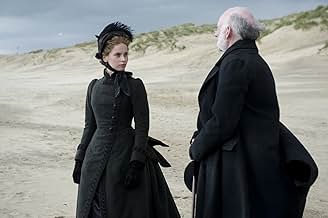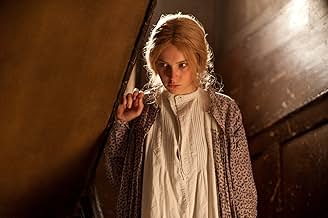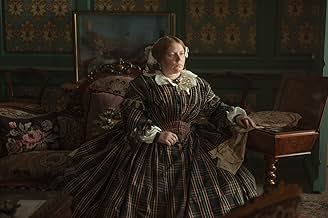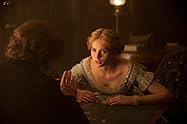VALUTAZIONE IMDb
6,1/10
10.780
LA TUA VALUTAZIONE
Al culmine della sua carriera, Charles Dickens incontra una donna più giovane che diventa la sua amante segreta fino alla sua morte.Al culmine della sua carriera, Charles Dickens incontra una donna più giovane che diventa la sua amante segreta fino alla sua morte.Al culmine della sua carriera, Charles Dickens incontra una donna più giovane che diventa la sua amante segreta fino alla sua morte.
- Regia
- Sceneggiatura
- Star
- Candidato a 1 Oscar
- 1 vittoria e 7 candidature totali
Ralph Fiennes
- Charles Dickens
- (as Mr. Ralph Fiennes)
Felicity Jones
- Nelly
- (as Ms. Felicity Jones)
Kristin Scott Thomas
- Mrs. Frances Ternan
- (as Ms. Kirstin Scott Thomas)
Tom Hollander
- Wilkie Collins
- (as Mr. Tom Hollander)
John Kavanagh
- Rev. William Benham
- (as Mr. John Kavanagh)
Tom Attwood
- Mr. Lambourne
- (as Mr. Tom Atwood)
Susanna Hislop
- Mary
- (as Ms. Susanna Hislop)
Tom Burke
- Mr. George Wharton Robinson
- (as Mr. Tom Burke)
Tommy Curson-Smith
- Geoffrey
- (as Mr. Tommy Curson-Smith)
David Collings
- Governor
- (as Mr. David Collings)
Michael Marcus
- Charley Dickens
- (as Mr. Michael Marcus)
Perdita Weeks
- Maria Ternan
- (as Ms. Perdita Weeks)
Richard McCabe
- Mr. Mark Lemon
- (as Mr. Richard McCabe)
Gabriel Vick
- Mr. Berger
- (as Mr. Gabriel Vick)
Mark Dexter
- Mr. Augustus Egg
- (as Mr. Mark Dexter)
Joseph Paxton
- Mr. Pigott
- (as Mr. Joseph Paxton)
Sophie Russell
- Miss Ellen Sabine
- (as Ms. Sophie Russell)
Christos Lawton
- Mr. Evans
- (as Mr. Christos Lawton)
Recensioni in evidenza
"Every human creature is a profound secret and mystery to every other."
In this follow up to his directorial debut, Coriolanus, Ralph Fiennes directs himself as Charles Dickens focusing on a specific period of his life rather than on a full blown biography. I am a huge fan of Dickens' work and have read many of his novels, but this film focuses on his later years after he had become a successful and respected writer. He was a very popular figure during the Victorian Age and we get glimpses of this here in The Invisible Woman as he struggles to hide his affection for a teenage stage actress he encounters named Nelly Ternan (played by Felicity Jones). Dickens is married, but he finds no fulfillment in his wife who doesn't understand his work. But since he's such a public figure, he must keep his affair a secret which is something Nelly finds hard to accept. This period piece stands out visually thanks to the beautiful costume design and setting which transports us to the Victorian Age. The Oscar nomination for achievement in costume design was well deserved although it lost out to The Great Gatsby. The performances from Felicity Jones and Ralph Fiennes were superb and the chemistry between them was strong, but the major issue with this film has to do with its slow pacing. The film is a little less than two hours long, but it feels like much more. However it's hard to resist this film due to the charm that Fiennes' Dickens evokes on the viewer. We have read his novels where he bears his soul about his troubled and difficult past (David Copperfield is my favorite work of his and it is his most autobiographical one), but I really never pictured him as this successful writer who enjoyed the spotlight and had such charisma. Its that very essence of Dickens that got me through the movie.
The Invisible Woman was adapted by Abi Morgan from Claire Tomalin's book and it focuses on Dickens' affair from Nelly's point of view as she dealt with the pain of their secret relationship despite having a privileged life. Everything about this period piece looks beautiful, but still it feels like its missing something and I quite can't figure it out yet. I can't fully grasp the mystery as to why Nelly accepted to live this life while internally she despised herself for it. The film doesn't bear her soul, but only shows signs of this externally through her strong performance. She is troubled and despite her admiration for Dickens' work we don't see that same passion in her eyes that he shares for her. The supporting performances from Kristin Scott Thomas, Tom Hollander, and Joanna Scanlan do lift the movie. Scanlan plays an important role as Dickens' wife as she comes to grasp the reality of her husband's affair. It's the poor way she's treated by Dickens that turns her off. However, Dickens is so charming that it's hard not to like him. Scott Thomas plays Nelly's mother and she is the one that convinces her to accept the life Dickens offers her. The film explores this complex relationship and it succeeds in most part thanks to the strong performances but it still fails to engage us more in their world. Just like Nelly's repressed emotions, the film at times feels repressed and doesn't quite manage to open up for the audience.
In this follow up to his directorial debut, Coriolanus, Ralph Fiennes directs himself as Charles Dickens focusing on a specific period of his life rather than on a full blown biography. I am a huge fan of Dickens' work and have read many of his novels, but this film focuses on his later years after he had become a successful and respected writer. He was a very popular figure during the Victorian Age and we get glimpses of this here in The Invisible Woman as he struggles to hide his affection for a teenage stage actress he encounters named Nelly Ternan (played by Felicity Jones). Dickens is married, but he finds no fulfillment in his wife who doesn't understand his work. But since he's such a public figure, he must keep his affair a secret which is something Nelly finds hard to accept. This period piece stands out visually thanks to the beautiful costume design and setting which transports us to the Victorian Age. The Oscar nomination for achievement in costume design was well deserved although it lost out to The Great Gatsby. The performances from Felicity Jones and Ralph Fiennes were superb and the chemistry between them was strong, but the major issue with this film has to do with its slow pacing. The film is a little less than two hours long, but it feels like much more. However it's hard to resist this film due to the charm that Fiennes' Dickens evokes on the viewer. We have read his novels where he bears his soul about his troubled and difficult past (David Copperfield is my favorite work of his and it is his most autobiographical one), but I really never pictured him as this successful writer who enjoyed the spotlight and had such charisma. Its that very essence of Dickens that got me through the movie.
The Invisible Woman was adapted by Abi Morgan from Claire Tomalin's book and it focuses on Dickens' affair from Nelly's point of view as she dealt with the pain of their secret relationship despite having a privileged life. Everything about this period piece looks beautiful, but still it feels like its missing something and I quite can't figure it out yet. I can't fully grasp the mystery as to why Nelly accepted to live this life while internally she despised herself for it. The film doesn't bear her soul, but only shows signs of this externally through her strong performance. She is troubled and despite her admiration for Dickens' work we don't see that same passion in her eyes that he shares for her. The supporting performances from Kristin Scott Thomas, Tom Hollander, and Joanna Scanlan do lift the movie. Scanlan plays an important role as Dickens' wife as she comes to grasp the reality of her husband's affair. It's the poor way she's treated by Dickens that turns her off. However, Dickens is so charming that it's hard not to like him. Scott Thomas plays Nelly's mother and she is the one that convinces her to accept the life Dickens offers her. The film explores this complex relationship and it succeeds in most part thanks to the strong performances but it still fails to engage us more in their world. Just like Nelly's repressed emotions, the film at times feels repressed and doesn't quite manage to open up for the audience.
So much so that her husband forgets to name her when introducing his family. Charles Dickens was always fascinated by very young, slender, virginal girls, they are venerated in all his novel. His wife had been such a girl when he married her, but after giving him ten children in a period without anesthetic, she has naturally gained weight and aged. He may tell himself the classic, "my wife doesn't understand me," but it's clear he really just wants a new young, slender girl. The film itself doesn't seem to buy the story that his wife is intellectually boring but instead clearly shows Dickens flinching in disgust when he looks at his wife.
Neither are we shown any brilliance of mind in Nelly as the actress maintains a slack jawed, rabbit-like expression through most of her scenes.
Most biographies depict Dickens as not only treating his wife as invisible, but openly ridiculing her and inventing ways to be cruel to her. We see an example of that here when he makes her take his gift of jewelry to his mistress.
Why we should find this affair romantic I don't know. It's boring and trite and, worst of all, taints any future reading of his novels. A film about the life of Catherine Dickens sounds much more interesting.
Neither are we shown any brilliance of mind in Nelly as the actress maintains a slack jawed, rabbit-like expression through most of her scenes.
Most biographies depict Dickens as not only treating his wife as invisible, but openly ridiculing her and inventing ways to be cruel to her. We see an example of that here when he makes her take his gift of jewelry to his mistress.
Why we should find this affair romantic I don't know. It's boring and trite and, worst of all, taints any future reading of his novels. A film about the life of Catherine Dickens sounds much more interesting.
With The Invisible Woman being the second feature in which Ralph Fiennes tackles Charles Dickens, you may say that the thespian, already known for his love of Shakespeare, has developed a new romance with English literature.
With Fiennes at the helm, this biographical drama, based on the book by Claire Tomalin, takes a stroll into the private life of the public figure, Charles Dickens. Although The Invisible Woman positions itself at the heart of the Victorian literate, this is in fact the story of Nelly Ternan (Felicity Jones); hence the title.
The bulk of this character-piece plays out as a flashback, as the narrative oscillates between the world of Dickens and the world post-Dickens. The mysterious title refers to the young Nelly, an avid-admirer of the literary colossus, as she enters into a secret affair with her idol. She spends the best part of her youth amorously involved with the writer, but given that Dickens was a lot older, it was inevitable that she would outlive her lover.
Alone with her thoughts, Nelly, dressed in mournful black, marches along the beaches of Margate like a sleepwalker in the night, tormented by the loss of her companion; she must find a way to bring that chapter of her life to a close so that she may now move on.
The picture paints Dickens as the talented and charitable man that he was, however we are also privy to a more sinister side of the wordsmith, as we learn of his malicious actions towards his wife (played by Joanna Scanlon).
The camera takes its time, as it soaks up the brilliant performances of the cast and Abi Morgan's (Shame, The Iron Lady) masterful script provides a titillating narrative, as it transports us to the Dickensian period. Ultimately, The Invisible Woman stands as a beautifully crafted piece of filmmaking, however, it somewhat pales in comparison to Fiennes' earlier, more vigorous work. Anthony Lowery
www.moviematrix.co.uk
With Fiennes at the helm, this biographical drama, based on the book by Claire Tomalin, takes a stroll into the private life of the public figure, Charles Dickens. Although The Invisible Woman positions itself at the heart of the Victorian literate, this is in fact the story of Nelly Ternan (Felicity Jones); hence the title.
The bulk of this character-piece plays out as a flashback, as the narrative oscillates between the world of Dickens and the world post-Dickens. The mysterious title refers to the young Nelly, an avid-admirer of the literary colossus, as she enters into a secret affair with her idol. She spends the best part of her youth amorously involved with the writer, but given that Dickens was a lot older, it was inevitable that she would outlive her lover.
Alone with her thoughts, Nelly, dressed in mournful black, marches along the beaches of Margate like a sleepwalker in the night, tormented by the loss of her companion; she must find a way to bring that chapter of her life to a close so that she may now move on.
The picture paints Dickens as the talented and charitable man that he was, however we are also privy to a more sinister side of the wordsmith, as we learn of his malicious actions towards his wife (played by Joanna Scanlon).
The camera takes its time, as it soaks up the brilliant performances of the cast and Abi Morgan's (Shame, The Iron Lady) masterful script provides a titillating narrative, as it transports us to the Dickensian period. Ultimately, The Invisible Woman stands as a beautifully crafted piece of filmmaking, however, it somewhat pales in comparison to Fiennes' earlier, more vigorous work. Anthony Lowery
www.moviematrix.co.uk
If a renowned writer were to embark in an affair with a younger woman, it would make some headlines, generate some chatter but most of us will leave it at that.
That was not the case in the 1850's. When esteemed author Charles Dickens begun an affair, all sorts of efforts were put in place to stop it from becoming public. Divorce in that time, was an absolute scandal, an abomination.
So, this young, attractive, talented woman who in all certainty had a profound effect in the works of one of the most respected writers in the English language was in effect an invisible woman. Whilst she was the centre of Dickens' world, the world ought to not know her. Such were those times.
Whilst it might appear as sluggish, even flat that is not so. We get to observe the effect of the affair amongst people who had a compulsion to appear composed and reserved at all times. It is a glimpse in to a world gone by.
That was not the case in the 1850's. When esteemed author Charles Dickens begun an affair, all sorts of efforts were put in place to stop it from becoming public. Divorce in that time, was an absolute scandal, an abomination.
So, this young, attractive, talented woman who in all certainty had a profound effect in the works of one of the most respected writers in the English language was in effect an invisible woman. Whilst she was the centre of Dickens' world, the world ought to not know her. Such were those times.
Whilst it might appear as sluggish, even flat that is not so. We get to observe the effect of the affair amongst people who had a compulsion to appear composed and reserved at all times. It is a glimpse in to a world gone by.
The titular Invisible Woman is Nelly Ternan, the young woman who became Charles Dickens' (1812-1870) mistress. How this liaison came about was a complete surprise to me and therefore must remain unsaid since it would IMO constitute a spoiler (most folks plow right through spoiler alerts anyway so that won't work). Nelly is played by Felicity Jones and Kristin Scott Thomas plays Nelly's mother, both who are more than competent but who have unspectacular roles.
It's all Ralph Fiennes who plays Dickens as ebullient, enthusiastic, and even flamboyant and is given a great opportunity to shine, which he does.. He also directs and was not originally set to play the lead but they couldn't find anyone else. Fiennes dominates the film so and yet the best parts for me was the work of an actress named Joanna Scanian who plays poor Mrs Dickens. Short and rotund and with an appearance of possible simple-mindedness (first impression) she rallies and practically steals the show. She is intelligent, perspicacious in how she views her husband, and is quietly courageous in an awkward scene with Nelly.
After reading the separation letter from Charles, her breakdown is severe yet restrained exhibiting an extraordinary piece of slice-of-life acting. If Charles likeability, which is considerable, is to make us forgive him for his treatment of his wife, it will have to withstand the effect of her scenes, which makes us look at him more harshly. And yet she doesn't attack him directly, it's her person that effects us (and with very little screen time). After reading a little of the history, the film seems a faithful rendering.
It's all Ralph Fiennes who plays Dickens as ebullient, enthusiastic, and even flamboyant and is given a great opportunity to shine, which he does.. He also directs and was not originally set to play the lead but they couldn't find anyone else. Fiennes dominates the film so and yet the best parts for me was the work of an actress named Joanna Scanian who plays poor Mrs Dickens. Short and rotund and with an appearance of possible simple-mindedness (first impression) she rallies and practically steals the show. She is intelligent, perspicacious in how she views her husband, and is quietly courageous in an awkward scene with Nelly.
After reading the separation letter from Charles, her breakdown is severe yet restrained exhibiting an extraordinary piece of slice-of-life acting. If Charles likeability, which is considerable, is to make us forgive him for his treatment of his wife, it will have to withstand the effect of her scenes, which makes us look at him more harshly. And yet she doesn't attack him directly, it's her person that effects us (and with very little screen time). After reading a little of the history, the film seems a faithful rendering.
Lo sapevi?
- QuizRalph Fiennes and Felicity Jones appeared in L'ordine naturale dei sogni (2010), in which they played father and daughter. In a 2013 interview with Jones and Fiennes on National Public Radio, Jones said that it was "weird" and "very Freudian" to go from playing one relationship to the other, but Fiennes disagreed, saying "It's just a job. Come on."
- BlooperWhen collecting cash for the hospital, there is an 1895 Crown coin on the plate. Charles Dickens died in 1870.
- Citazioni
Charles Dickens: A wonderful fact to reflect upon, that every human creature is a profound secret and mystery to every other.
Nelly: Until that secret is given to another to look after. And then perhaps two human creatures may know each other.
- Curiosità sui creditiThe full cast list (in order of appearance) is presented in the style of a Dickens era theatre programme, with contemporary font and the performers' names preceded by "Mr." or "Ms."
- ConnessioniFeatured in Film '72: Episodio datato 30 gennaio 2014 (2014)
- Colonne sonoreSir Roger de Coverly
(uncredited)
Traditional
[Dickens dances with Nelly]
I più visti
Accedi per valutare e creare un elenco di titoli salvati per ottenere consigli personalizzati
- How long is The Invisible Woman?Powered by Alexa
Dettagli
- Data di uscita
- Paesi di origine
- Sito ufficiale
- Lingue
- Celebre anche come
- Görünmeyen Kadın
- Luoghi delle riprese
- Aziende produttrici
- Vedi altri crediti dell’azienda su IMDbPro
Botteghino
- Lordo Stati Uniti e Canada
- 1.234.254 USD
- Fine settimana di apertura Stati Uniti e Canada
- 31.948 USD
- 29 dic 2013
- Lordo in tutto il mondo
- 3.986.888 USD
- Tempo di esecuzione1 ora 51 minuti
- Colore
- Mix di suoni
- Proporzioni
- 2.35 : 1
Contribuisci a questa pagina
Suggerisci una modifica o aggiungi i contenuti mancanti






































